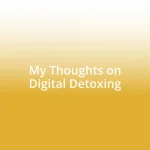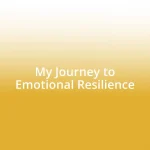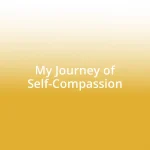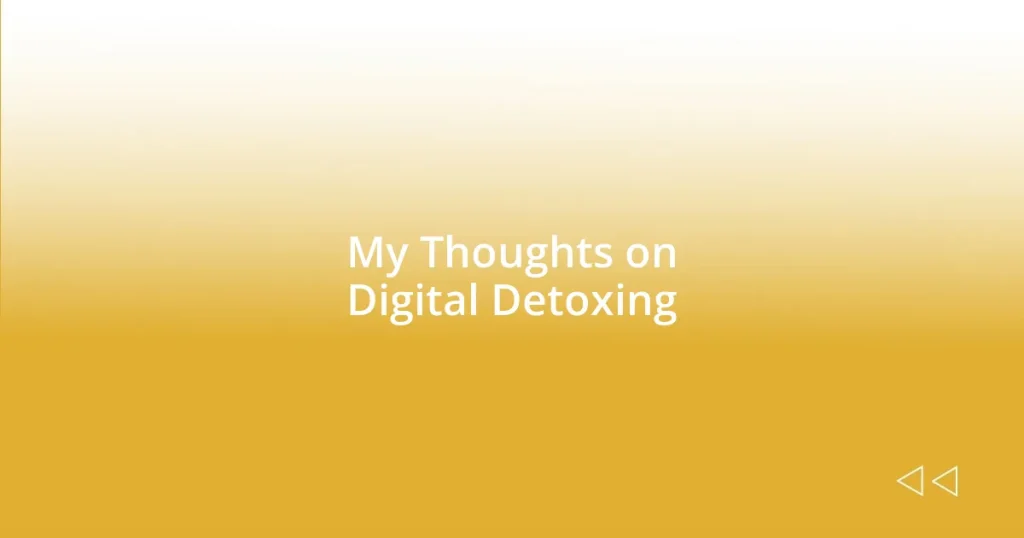Key takeaways:
- Digital detoxing improves mental well-being by reducing stress and allowing for genuine face-to-face connections.
- Identifying signs of digital overuse—such as fatigue, distraction during conversations, and irritability—can help establish healthier tech habits.
- Setting clear boundaries, like tech-free zones and scheduled device use, enhances focus and enriches real-life interactions.
- Incorporating offline activities, such as nature walks and cooking, fosters creativity and grounding, helping individuals reconnect with themselves.
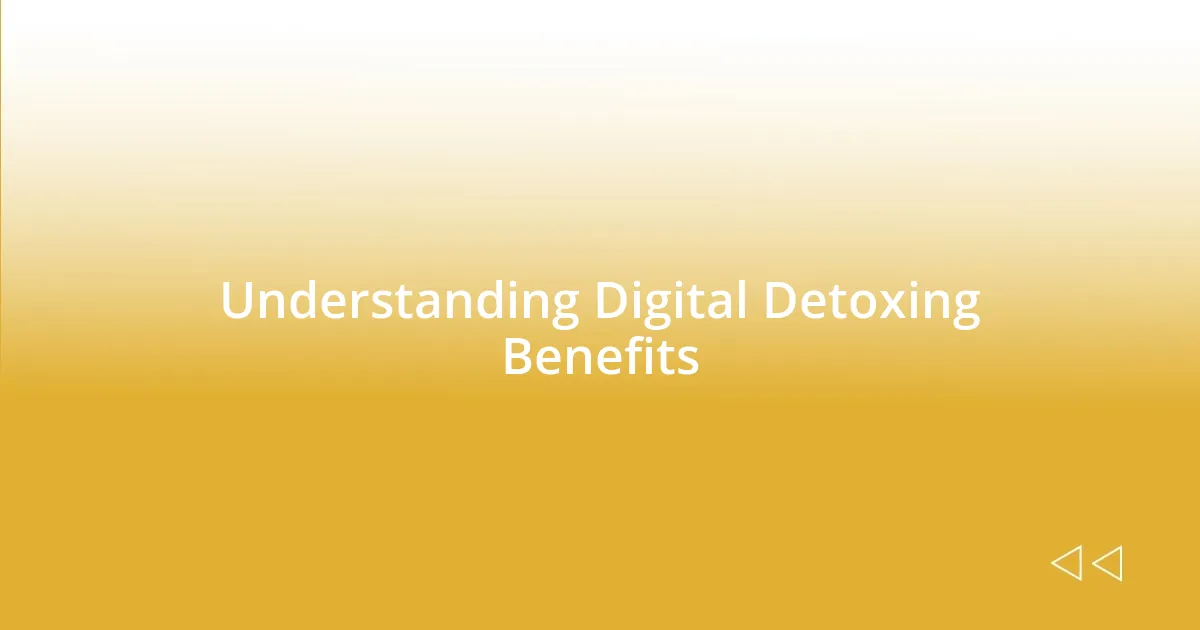
Understanding Digital Detoxing Benefits
Digital detoxing offers a refreshing break from the constant bombardment of notifications and information, allowing us to reconnect with ourselves and our surroundings. I remember one weekend when I decided to unplug completely. The clarity I gained from simply being present in nature and engaging in face-to-face conversations was profound. Isn’t it amazing how stepping back can actually help us see things more clearly?
Another key benefit lies in the improvement of mental well-being. When I took a week off from my devices, I noticed my stress levels plummeted. Instead of scrolling through social media and feeling overwhelmed, I found joy in activities like reading and cooking. Have you ever felt a wave of peace wash over you after disconnecting? It’s like rediscovering parts of yourself that had been buried under layers of digital noise.
Moreover, digital detoxing can enhance our relationships. I recall a dinner where everyone put their phones away—what a difference it made! We engaged in deep conversations and laughter that felt genuine and connected. Do you often find yourself distracted by your phone during meals? Consider how powerful it could be to cherish those moments without digital interruptions.
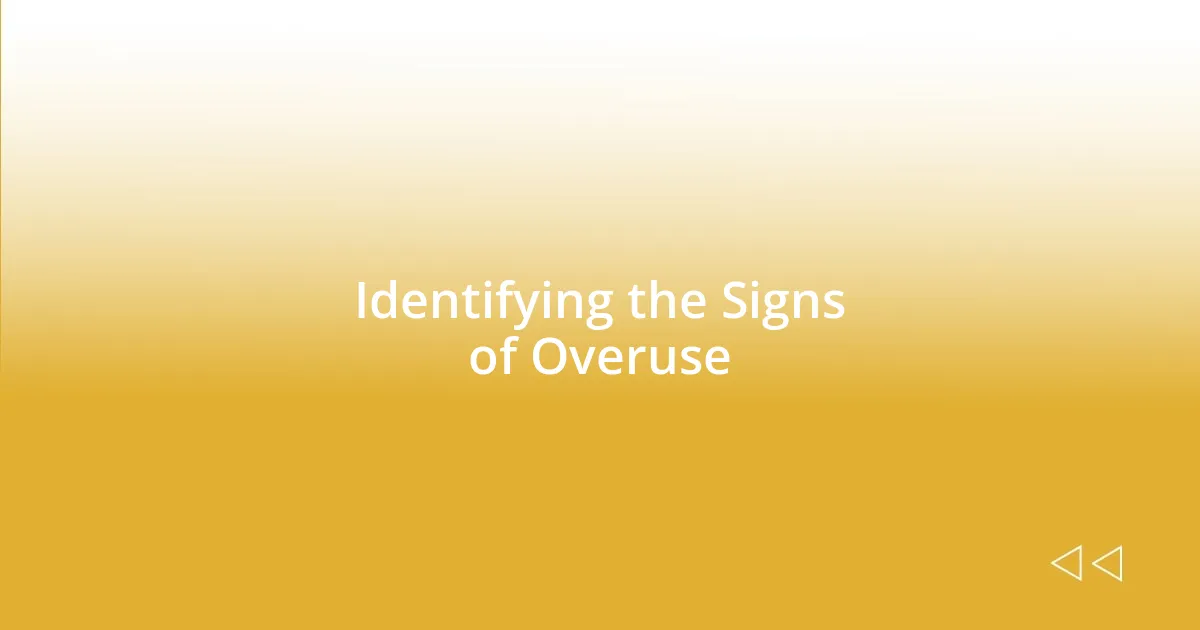
Identifying the Signs of Overuse
It’s fascinating how subtly the signs of digital overuse creep into our lives. One moment, you’re just checking your phone, and the next, hours have slipped away. Personally, I’ve noticed that when I find myself scrolling aimlessly, I feel a nagging sense of anxiety creeping in. Is it just me, or does that fleeting “refresh” lose its charm when it turns into mindless repetition?
Here are some signs that might indicate you’re experiencing digital overuse:
– You frequently feel fatigued but keep reaching for your devices.
– Conversations feel less engaging because you’re distracted by notifications.
– You struggle to concentrate on tasks without checking your phone.
– You feel irritable or anxious when unable to access your devices.
– Time intended for relaxation turns into a scroll-fest instead.
Reflecting on these signs can give you valuable insights into your relationship with technology and help you take the necessary steps towards a healthier digital balance.
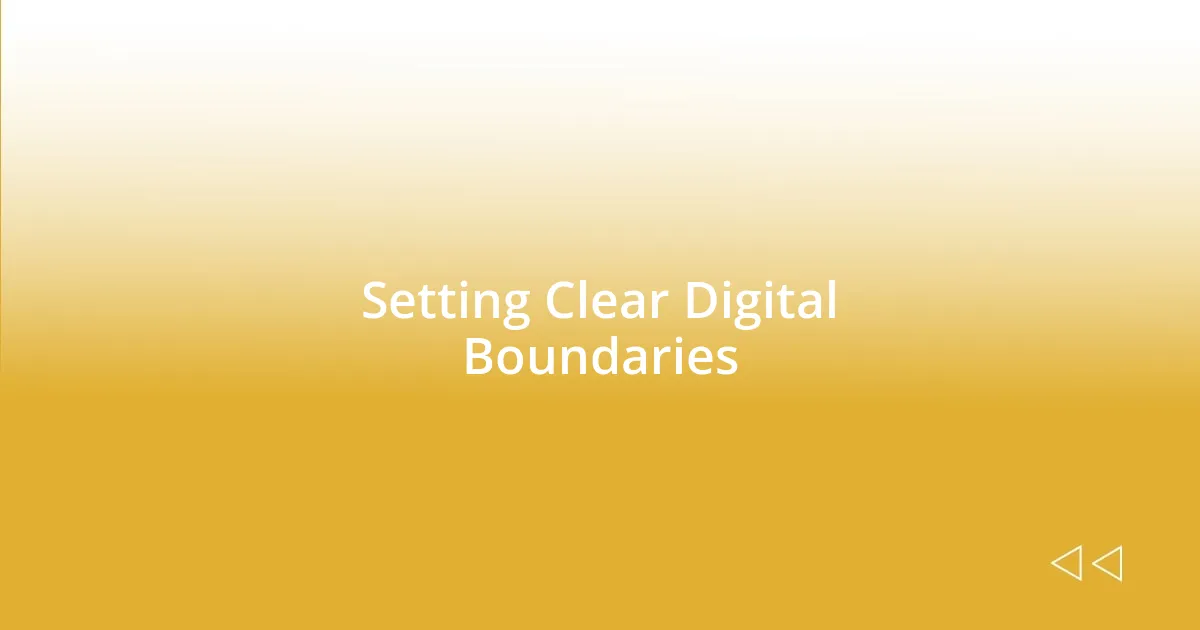
Setting Clear Digital Boundaries
Setting clear digital boundaries is crucial in today’s hyperconnected world. I have found that defining specific times to use my devices has significantly reduced my digital stress. For instance, I dedicate my mornings to reading instead of scrolling through emails. This simple change has transformed my day, making me more focused and present.
One effective boundary is to designate tech-free zones in your home. I remember setting a rule that no phones would be allowed at the dining table. This small adjustment made our meals much more enjoyable and encouraged authentic conversations. Have you ever tried putting your devices away during mealtimes? The experience can be surprisingly liberating.
In my experience, utilizing apps to track and limit screen time has also been a game changer. I recall using a time management app that allowed me to see just how much time I was spending on various apps. This awareness prompted me to set restrictions, leading to more productive days and less mindless scrolling. Isn’t it fascinating how a little structure can lead to greater freedom?
| Tech Boundary | Benefits |
|---|---|
| Designating Tech-Free Zones | Encourages real-life interactions and improves connection. |
| Setting Scheduled Device Use Times | Enhances focus and decreases anxiety from constant notifications. |
| Using Apps for Screen Time Management | Increases awareness of usage patterns leading to healthier habits. |
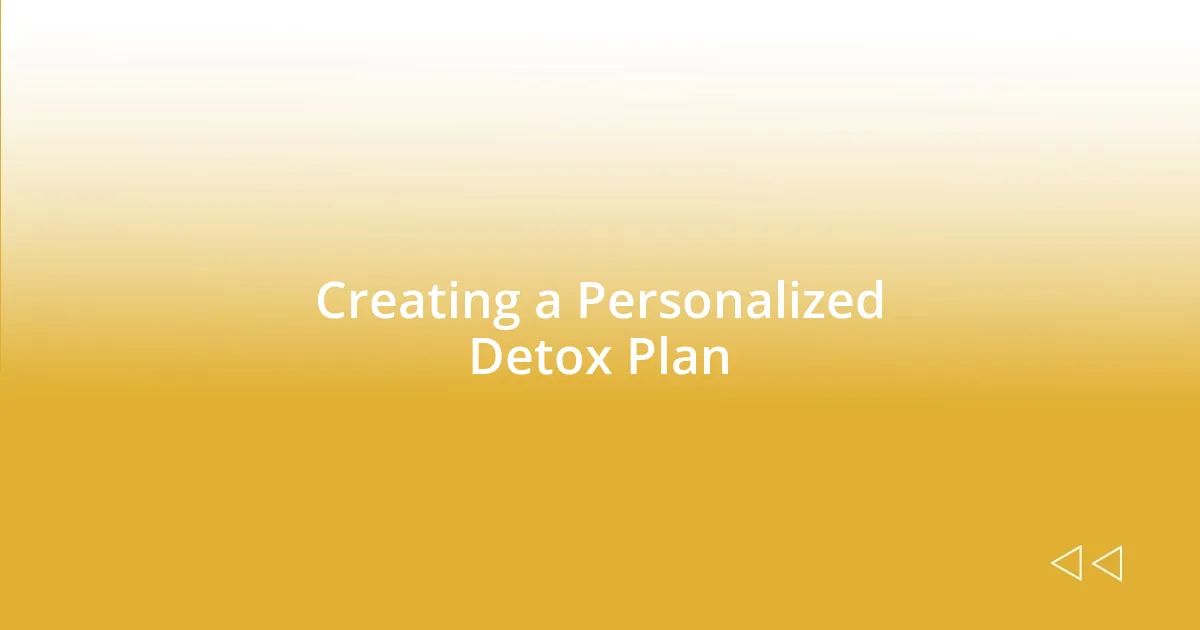
Creating a Personalized Detox Plan
Creating a personalized detox plan starts with self-reflection. I often ask myself what my digital habits truly look like. Are there certain times when I feel more tempted to reach for my phone? By identifying specific triggers, I can better understand when and why I need a break. It’s almost like holding up a mirror to my daily routine, revealing where adjustments can be made.
Next, I find it helpful to set realistic goals tailored to my lifestyle. For example, rather than aiming for a complete tech blackout, I focus on designating certain hours as device-free. When I first tried this, I chose Sunday mornings, and honestly, it felt liberating just to sit outside with a good book. Can you imagine how refreshing it would be to reclaim those moments without the buzz of notifications?
Lastly, I encourage adapting the plan as needed. Flexibility can be key. I’ve adjusted my approach several times based on what feels right in the moment. Just last month, I realized that my evening routine needed a tweak; turning off screens an hour before bed drastically improved my sleep quality. What’s your evening routine like? Maybe trying a digital detox during those hours could help you, too.
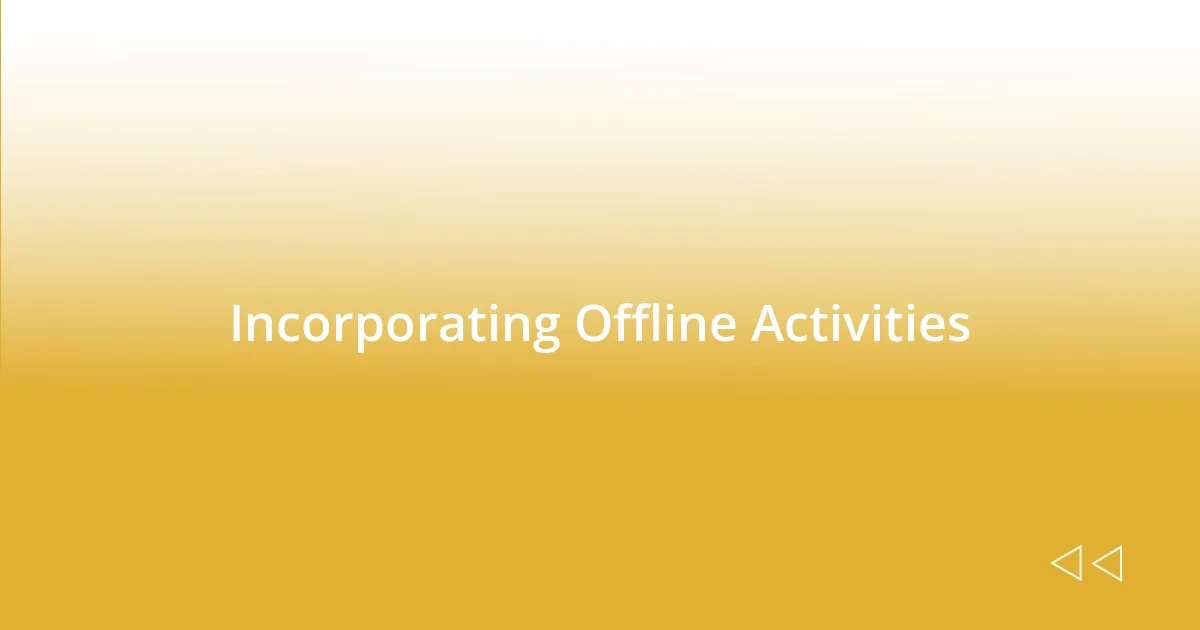
Incorporating Offline Activities
Incorporating offline activities into my daily routine has been transformative. One of my favorite ways to disconnect is through nature walks. There’s something soothing about being surrounded by trees and listening to the rustle of leaves—it’s like an instant reset button. Have you ever paused to truly enjoy your surroundings? I often find that a little fresh air can clear my mind much more effectively than scrolling through social media ever could.
Painting has also emerged as a delightful offline pursuit for me. I remember picking up a brush after years away from it, and I was surprised at how deeply it engaged my mind. The colors, the strokes, the canvas—everything became a form of meditation. Isn’t it interesting how using our hands can take us away from screens? When was the last time you allowed yourself to be fully immersed in a creative activity?
Cooking has become another cherished offline activity. I’ve noticed that whipping up a new recipe not only nourishes my body but also sparks joy in my heart. The aromas wafting through my kitchen create a comforting atmosphere that technology simply can’t replicate. Have you ever found peace in the kitchen? It’s incredible how engaging in such a fundamental task can ground us and bring us back to the present moment.
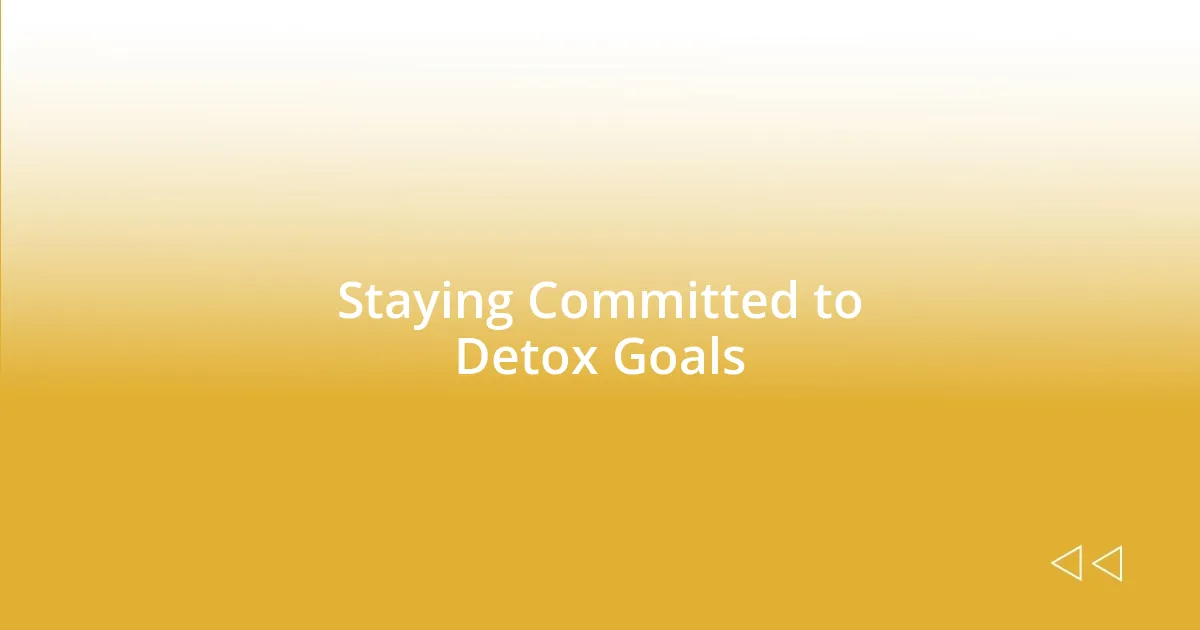
Staying Committed to Detox Goals
Staying committed to my detox goals often requires a bit of self-discipline. There are days when the lure of my phone is strong, especially during downtime. In those moments, I remind myself of the sense of clarity I felt during my most recent detox period. I still remember the joy of being fully present with friends, laughing without distraction. Doesn’t that kind of connection feel invaluable?
To strengthen my commitment, I’ve turned to accountability partners. Sharing my detox journey with a friend not only gives me extra motivation but also creates a space for supportive discussions. I remember when I partnered with a close friend; we’d text each other after our designated phone-free hours, celebrating our successes or sharing struggles. Have you considered finding someone to join you on your journey? It makes the process so much more enjoyable and less isolating.
Tracking my progress has also been a game-changer. I started a simple journal where I note my feelings before and after each detox session. Reflecting on these entries has revealed so much about my emotional responses and habits. I often find that post-detox, I feel light and more focused—a true gift in today’s digital age. What if you could experience that same clarity? It’s pretty rewarding to see your growth laid out in front of you, isn’t it?
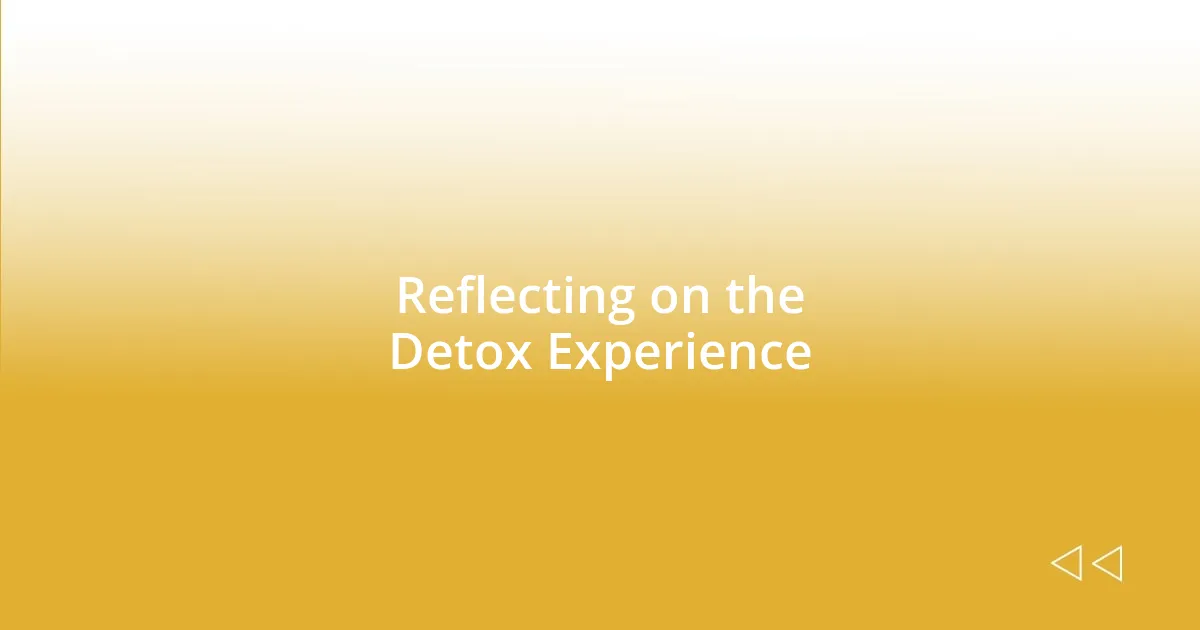
Reflecting on the Detox Experience
Reflecting on my detox experience takes me down a path filled with unexpected revelations. I remember the first few days without my usual digital distractions; it felt like I had lost a layer of my identity. But as the days passed, I began to uncover parts of myself that had been dormant. Was it liberating to be disconnected? Absolutely. There’s something magical about rediscovering hobbies I had long neglected—like reading a physical book. Can you recall the last time you got lost in a story without notifications buzzing around you?
As I navigated through this detox, I experienced waves of emotions ranging from restlessness to profound peace. At first, I struggled with the silence, almost like a constant itch that needed scratching. However, embracing that quiet became a source of clarity. I vividly remember sitting on my porch one afternoon, listening to birds chirping while sipping my coffee. It struck me then—how often do we overlook these small joys when fixated on our screens? Have you ever stopped to appreciate the world around you?
In realizing the impact of digital detoxing on my overall well-being, I learned so much about what truly nourishes my soul. I recall jotting down these insights in my journal, each word echoing my growing desire for balance. I found myself understanding that the time spent offline wasn’t just a break; it was a pathway to reconnect with what truly matters—relationships, self-care, and moments of sheer joy. Isn’t it fascinating how stepping back can illuminate our priorities in a world filled with noise?


